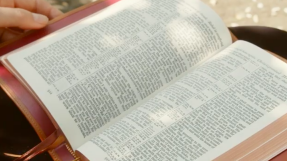Jesus was fond of children. He said in Matthew 19:14 to the disciples who wanted to stop them bothering him, 'Let the little children come to me and do not hinder them, for the Kingdom of Heaven belongs to such as these.'

But in Matthew 18:6 and Luke 17:2 he goes further, saying it would be 'better for you if a millstone were hung around your neck and you were thrown into the sea than for you to cause one of these little ones to stumble'.
We often assume these verses have something to do with causing children harm – we are much, much more sensitive today about how fragile children are, physically and emotionally, than previous generations, and so we ought to be. We do not tolerate the ill-treatment of children, and when it surfaces, in families or institutions, we are horrified.
But that's not exactly what the verse says – or means. Jesus specifically says 'stumble', and the implication is that the child is being led commit some fault or sin.
And that is a very challenging statement. We – in families, in churches, in society at large – are given the huge responsibility of helping to form children in body, mind and spirit. How we treat them, how we behave in front of them and how we teach them really matter. They take us as their examples. They are formed by what they see and hear.
If we teach them that violence is OK, they'll be violent. If we we teach them to hate people because they're different, they will. If we teach them wrong doctrines, that's what they'll know of Christianity, and if they grew up with a warped view of the faith we are responsible.
We have the wonderful, God-given privilege of showing the next generation how to be Christians. And Jesus says we will be judged most severely if we get it wrong.
That could frighten us and make us scared to engage with children at all. That would be wrong, too – and God knows we won't always get it right as we try to influence them for good, and he is ready to forgive. But these verses should sharpen our attention: they challenge us to do better, and remind us just how much Jesus cares about children – and how much he expects of us as we care for them.













